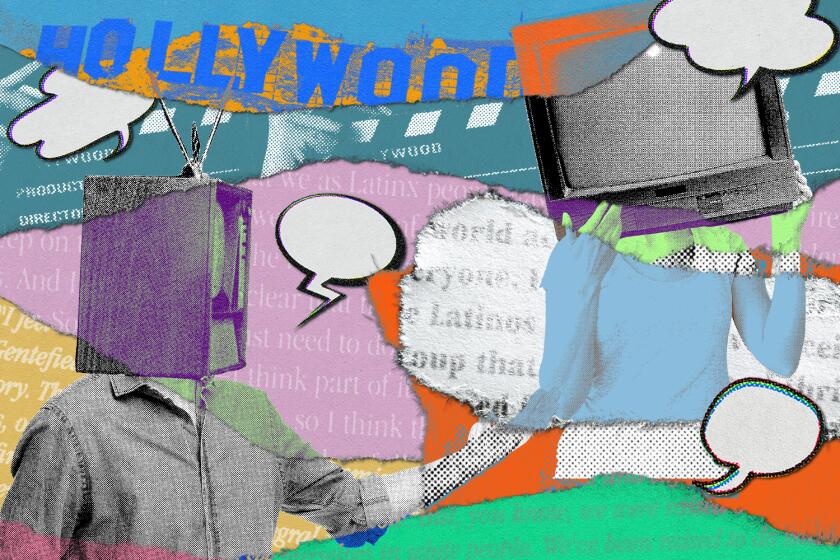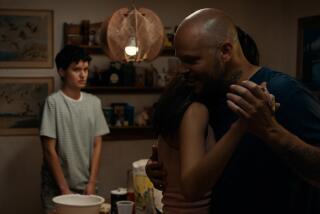‘We fell short’: Lin-Manuel Miranda is sorry for ‘In the Heights’ Afro-Latinx erasure
- Share via
Lin-Manuel Miranda, who conceived and wrote the music and lyrics for the stage hit “In the Heights,” apologized Monday for the lack of Afro-Latinx representation in the film adaptation, directed by John M. Chu.
“I can hear the hurt and frustration over colorism, of feeling still unseen in the feedback,” Miranda wrote on social media, saying that he’d seen the discussion happening around the movie. “I hear that without sufficient dark-skinned Afro-Latino representation, the work feels extractive of the community we wanted so much to represent with pride and joy.
“In trying to paint a mosaic of this community, we fell short,” he wrote. “I’m truly sorry.”
Miranda noted that while he had “incredible pride” in the movie, in which he’s cast in a small role, he also wanted to hold himself accountable for shortcomings.
“I’m dedicated to the learning and evolving we all have to do to make sure we are honoring our diverse and vibrant community,” the “Hamilton” musical creator said.
Set in New York’s Washington Heights, home to the Little Dominican Republic neighborhood in Upper Manhattan, the movie “In the Heights” follows three days in the life of Usnavi de la Vega (Anthony Ramos) and his neighbors.
While audiences were dazzled by the salsa, merengue, and hip-hop dance numbers in the film, which was released in theaters and on HBO Max last week, some were simultaneously angered and dismayed by its minimal Afro-Latinx and LGBTQ+ representation.
On the surface, the movie is championed by Chu, a groundbreaking director of color. The screenplay is by Quiara Alegría Hudes, who wrote the book for the stage musical.
Latinx audiences, key to the success of “Fast and Furious,” are Hollywood’s most dependable customers. Now they’re helping movie theaters bounce back after COVID-19. Will they be rewarded?
Miranda said Monday in his apology, “Over the past 20 years, all I wanted was for us — ALL of us — to feel seen....I’m truly sorry. I’m learning from the feedback, I thank you for raising it, and I’m listening.” But it may have come too late, as folks on social media were very clear in their criticisms.
“Anything about the Washington Heights community at large that don’t specifically center Black Dominicans (not just any Latinos — Black DOMINICANS),” said one user, “is a trash ass whitewashed fantasy.”
Carmen Phillips, Editor in Chief of Autostraddle, said, “By relegating Daniela and Carla to background sweetness, In the Heights asks queer Latinxs to settle...it asks Afro-Latinxs to settle. We are worth more than settling.”
In an interview last week with the Root, video producer Felice Léon, a Black woman of Cuban descent and a New York City native, probed Chu about the lack of Afro-Latinx representation. “Most of your principal actors were light-skinned or white-passing Latinx people,” Léon said. “With that, what are your thoughts on the lack of Black Latinx people represented in your film?”
“[W]e tried to get the people who were best for those roles, specifically,” Chu responded.
Soon after, “In the Heights” actress Melissa Barrera added in the interview that a lot of darker-skinned Afro-Latinos were a part of the audition process — but the directors wanted “the right people for the roles.”
Actors, writers, directors and executives discuss the state of Latino representation in film and TV with The Times.
She referred to Washington Heights as “a melting pot,” yet the one Black main character, Benny (Corey Hawkins), is not of Latinx descent. Castmate Leslie Grace, who identifies as Afro-Latina, said that upon reflection she realized that she didn’t often get to see people who looked like her darker-skinned siblings on screen.
Chu asked, “Did you not see that in the dancers?,” to which Léon replied that Black actors have often been relegated to the background. Colorism extends across racial and international lines in acting, leaving darker-skinned actors wondering if proximity to whiteness is the only way to enter the proverbial room where it happens.
Twitter users recalled that Chu fumbled South Asian representation in “Crazy Rich Asians,” demoting those actors to stereotypical domestic work roles while East Asians were the faces of opulence — which he told Insider he now regrets. However, per the Root, Chu said the lack of darker-skinned, Black Latinx people was something he admittedly “needed to be educated about” and “we should all be talking about.”
Apart from the colorism, audiences also critiqued the movie’s vague framing of same-sex couple Daniela (Daphne Rubin-Vega) and Carla (Stephanie Beatriz), saying the two were unrecognizable as romantic partners to viewers who were not a part of the LGBTQ+ community. Some desired more on-screen public displays of of affection, citing it as a missed opportunity to address and combat homophobia in Latinx communities.
Chu told the Root that while “we tried our best on all fronts,” he hopes more people feel encouraged to “tell more stories and go out there and do it right.”
One Twitter user noted that “Heights” carries an “unfair burden” to get it right; another stated that such excuses are weaponized by white people and do not absolve people of color in power of their responsibility.
“In the Heights” premiered in theaters Friday. Though the Broadway musical was a four-time Tony award-winning production, the movie adaptation took in a mere $11.4 million in its opening weekend, which points to what one media analyst called musicals’ “mixed track record at the box office.”
More to Read
Only good movies
Get the Indie Focus newsletter, Mark Olsen's weekly guide to the world of cinema.
You may occasionally receive promotional content from the Los Angeles Times.














